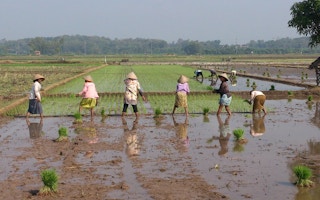The establishment of large-scale agriculture under the Indonesian government’s “food estate” programme is harming local farmers in Sumatra, a study has found.
The programme was announced in 2020 by President Joko Widodo to boost domestic food production and reduce reliance on crop imports. But in North Sumatra province, one of the regions where the programme’s massive farms are being established, food security for at least one village has gotten worse, researchers say.
Farmers in the village of Ria-Ria, were asked by the government to grow crops such as potatoes, garlic and shallots as part of the programme. As a consequence, their harvests of rice, their staple food crop, decreased by up to 70 per cent, according to the joint study by NGOs including Food First Information and Action Network (FIAN) Indonesia and the People’s Initiative Development and Study Group (KSPPM).
“The [rice] harvest is usually enough for one year, but since last year [when we were asked to] focus on the food estate programme, the harvest greatly declined,” said one farmer, identified only by her initials of I.S.
“
The food estate programme is positioned as a policy [to boost] production. But [we] forget that the ones involved [in the programme] are farmers.”
Gusti Nur Asla Shabia, researcher, Food First Information and Action Network
The farmers attributed this decline to the timing of the start of the food estate programme, in August 2021, which coincided with their rice-growing season. That meant they had to split their time and labor between tending to their rice crops and the food estate crops.
“The time to work on the paddy field, especially during the maintenance period such as weeding and clearing bushes, is reduced,” said another farmer, O.P. “As a result, [weeds] in the rice paddies grow thick and the amount of rats is uncontrollable. The harvest declined drastically, up to 70 per cent.”
And the harvest of the food estate crops failed to compensate for the decline in the rice harvest, due to the lower prices that they fetch at the local cooperatives where farmers sell their crops, according to Fuad Abdulgani, a FIAN Indonesia researcher.
“The ones who already sold their harvest to the cooperatives had to face fund management that’s not accountable, where the fund was only disbursed two months later,” he said during a recent online discussion. “All these resulted in lack of food for farmers’ households.”
This decline in productivity is especially concerning because up to 30 per cent of households in the village now lack enough rice to feed them for a whole year.
Fuad said the government has ignored this fact by pushing ahead with the food estate programme at the expense of addressing the villagers’ basic need for food.
Gusti Nur Asla Shabia, another FIAN Indonesia researcher, said the government had violated the villagers’ right to sufficient food.
“Food availability should be the responsibility of the state,” she said. “The food estate programme is positioned as a policy [to boost] production. But [we] forget that the ones involved [in the programme] are farmers.”
Besides harming the farmers’ food availability, the food estate programme also puts them at risk of losing their land rights, the researchers said.
Fuad said some of the Ria-Ria villagers had asked for legal titles to their land rights before the government commenced with the food estate programme.
“But this wasn’t accommodated through a land certification process before the food estate programme began,” he said.
This lack of formal recognition of their land rights compounds the farmers’ already weak position in the contracts they signed with the companies that would buy their food estate harvests, Fuad said.
“We didn’t find any contracts that placed both [the farmers and the companies] in an equal position,” he said. “What we found were statement letters whose clauses were determined by the companies without explaining the distribution of costs and benefits, and there’s no clear scheme for how to mitigate risk before the contracts were signed.”
This means the companies essentially wield control over the farmers’ lands, even in the few instances where a farmer holds legal title to their land, according to Fuad.
“Small farmers only become a supplier to agribusiness” under the food estate programme, he said.
Kartini Samon from GRAIN, a nonprofit that supports small farmers and social movements, said it’s clear the food estate programme isn’t aimed at bolstering food security in the country, but rather at privatising the nation’s food industry and growing crops for export.
“We see that the original intention [of the food estate programme] is to solve hunger and food insecurity due to the pandemic, but the target itself in the end is to penetrate the international market,” she said during the online discussion. “Once again, we see [our] farmers being given the responsibility to feed the world, but [we] forget that the ones who live in the food estate areas lose their food sources and livelihoods.”
Posman Sibuea, an agricultural lecturer at the Catholic University of St. Thomas in North Sumatra, said the food estate programme was designed with a top-down approach, meaning that local communities didn’t have a say in the design and implementation of the programme.
As a result, the crops chosen for the programme are those that suit agribusiness purposes, rather than those most suitable for feeding Indonesians, he said.
“It didn’t accommodate the aspirations of local farmers and local governments,” Posman said.
Miftah Firdaus, from the office of the Indonesian Ombudsman, welcomed reports submitted to the office showing that the food estate programme was found to be harming the rights of local communities.
“If the government proceeds with the food estate programme, there are things that have to be paid attention to,” he said during the discussion. “Don’t let the programme cause material and immaterial damage to the people. [We] have to make sure that no one is harmed.”
This story was published with permission from Mongabay.com.

















